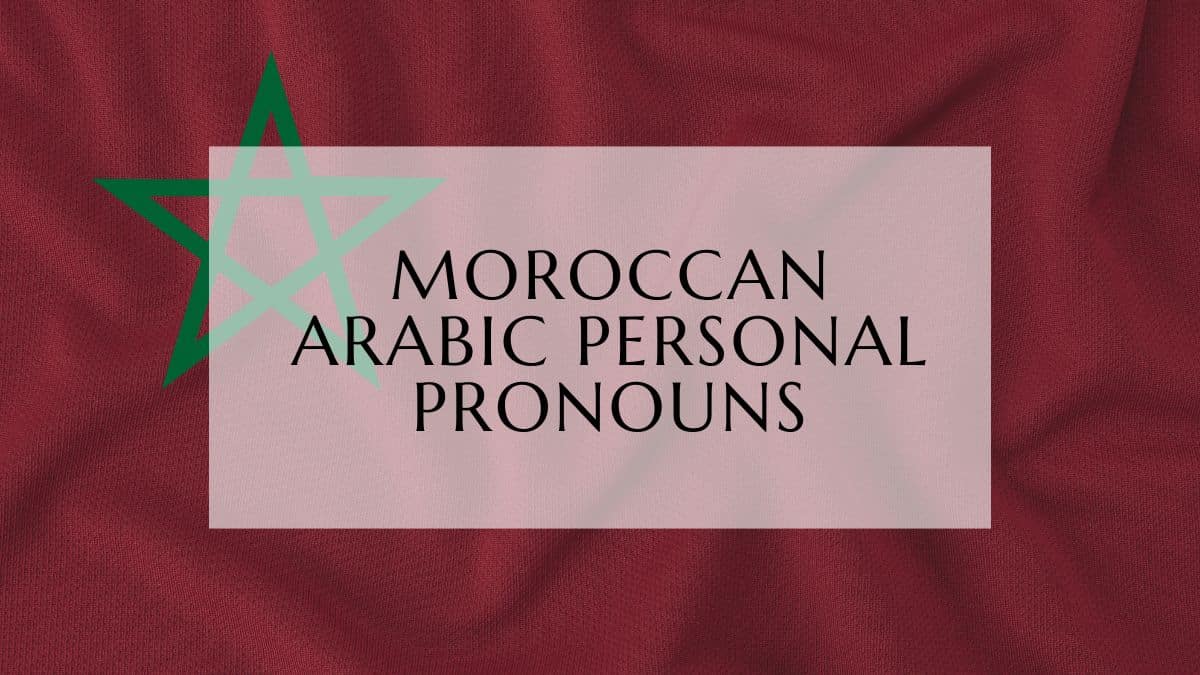Moroccan Arabic Personal Pronouns is one of the first basic lessons every Darija learner has to learn to talk about or describe anything, adding to that verbs, nouns, and adjectives to give complete sentences. So in this post, we will talk about the eight personal pronouns in Moroccan Arabic, how to use these pronouns with verbs, nouns, and adjectives, and then talk about the difference between Moroccan Arabic and Modern Standard Arabic MSA regarding this topic.

Moroccan Arabic Personal Pronouns
| English | Transcribed Moroccan Arabic | Using Arabic Alphabet |
| I/ me | Ana | أنا |
| You (feminine singular) | Nti / Ntiya | نتي / نتيا |
| You (masculine singular) | Nta / Ntaya | نتا / نتايا |
| He | Howa | هو |
| She | Hia/Hiya | هي |
| We/Us | 7na | حنا |
| You (plural, both men and women) | Ntuma | نتوما |
| They (both men and women) | Huma | هوما |
Using Darija Personal Pronouns With Nouns And Adjectives
Unlike English, you don’t need to use the verb “to be”, just the personal pronoun and the noun or adjective you would like to use, examples:
Ana Oualid , I am Oualid أنا وليد
Nta Mohami , you’re a lawyer نتا محامي
Nti dkiya, you’re smart
Howa mrid, he is sick هو مريض
Hiya zwina , she’s beautiful هي زوينة
Huma ferhanin , they are happy هوما فرحانين
Note: you can practice what you’ve learned here, and learn how to pronounce each of the words in our Memrise course here, don’t know how to use the platform or sign up? we’ve got you covered in this easy-to-follow tutorial here.
Using Darija Personal Pronouns With Verbs
In Darija, personal pronouns can be omitted while used with verbs as you can identify the subject from the conjugated verb, for example, the verb ktb (to write): if I say ktbt, it’s clear that the personal pronoun here is “I” , while ktbtu is referring to “they” (we will talk about the conjugation in other posts), but you can use the pronoun if you want to add the emphasis or just don’t know the conjugation well so at least you say the pronoun right.
- Ana ktbt , I wrote أنا كتبت
- Huma ktbu , they wrote هوما كتبو
Personal Pronouns In Moroccan Arabic Vs Modern Standard Arabic MSA
If you know Modern Standard Arabic and want to know the difference in personal pronouns or you’re just curious, this is for you (and they’re two)
First: if you’re addressing two people or more, in Moroccan Arabic it’s Ntuma, while in Standard Arabic there is Antuma/أنتما for two, and Antum/antunna أنتم/أنتن for three or more, which leads us to the second difference:
Second: the plural pronouns you and they are neutral in Darija, unlike in Moden Standard Arabic: you antum/ antunna أنتم/أنتن and they hum/hunna هم/هن
Happy learning!
